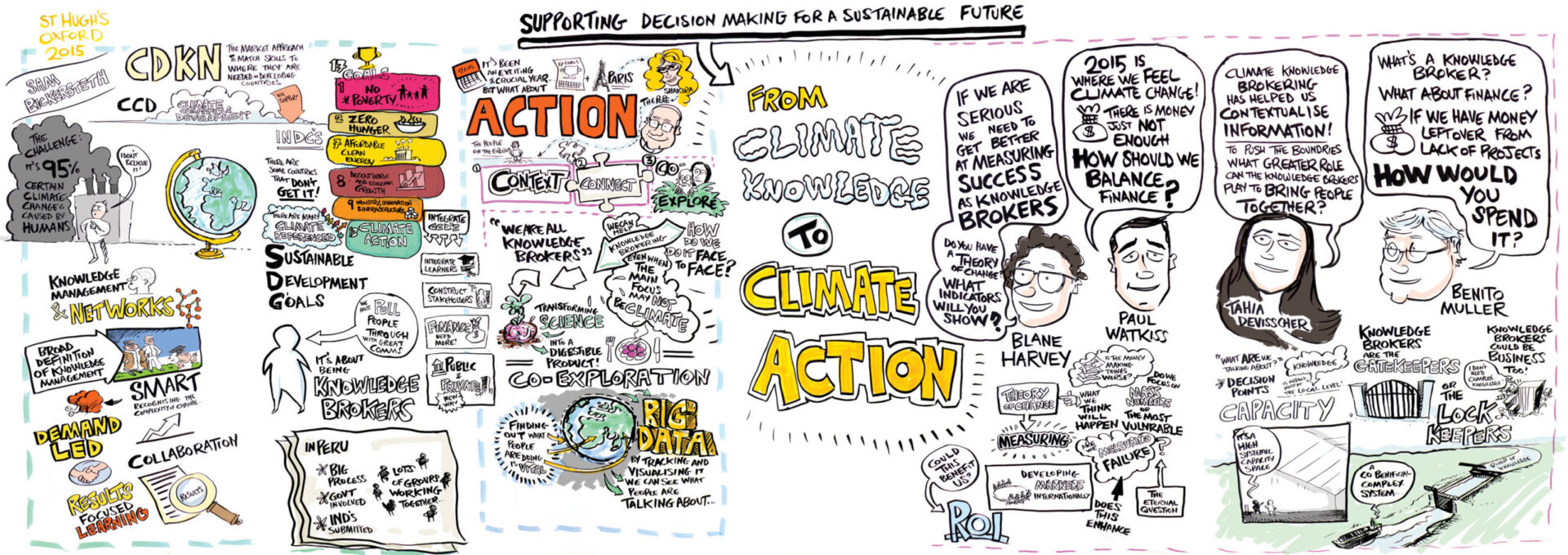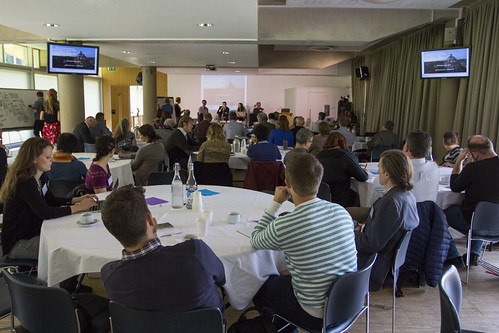Putting Climate Knowledge into Climate Action – SEI Oxford seminar 29th of September 2015

Introduction
How do we actually put climate knowledge into practice, against the backdrop of a year of high-level global events? That is, how do we link the global to the local and vice-versa? We know that the need for synthesizing, linking, curating and filtering climate knowledge is growing due to the increasing mass of information available to us today. With so many knowledge-brokering professionals still grappling with this, SEI Oxford took the opportunity to bring together experts in the field of climate change research in Oxford, for a lively and interactive discussion.
This page is gathering all key resources deriving from the seminar. This include a couple of presentations, photos and the recording from the seminar.
Here is a link to the Storify created the day after, with some key tweets and images.
Presentation by Sam Bickersteth, CEO CDKN
Sam Bickersteth, the CEO of Climate & Development Knowledge Network (CDKN), offered a thought-provoking keynote speech, in which he linked climate action to the recently adopted Sustainable Development Goals, but alluding that much work is still done in silos. He gave the example of that Goal #13 on climate action should be mainstreamed in all the other goals. He also highlighted the importance of knowledge management and networks based on his CDKN experience: “they should be demand-led, smart (recognising complexity of change processes), collaborative, and entail results-focused learning.” Check out his presentation below to learn more:
Sam Bickersteth, CEO of CDKN, at SEI Oxford seminar 29th of September 2015 from weADAPT Learn – Share – Connect on SlideShareSEI Oxford researchers presents: Putting Climate Knowledge into Climate Action
“The extent to which we explore the real questions around ‘context’ and really exploring user needs determines how effective our actions are. We cannot start with the assumption that we have the right questions and therefore the right outcomes in mind. This is especially significant now, at a time when we have access to so much data.”
SEI Oxford researchers Harro van Asselt and Sukaina Bharwani talked about how to translate global climate and development goals to the local level. Explore their presentation made with the presentation tool Prezi. In their presentation, the co-production of knowledge was stressed as being crucial to identify the right questions and the balance between both co-producing and brokering knowledge – what is increasingly referred to as co-exploration in SEIs work – requires a process of iterative social and institutional learning. SEI Oxford has been groundbreaking in using ‘mixed-method’ approaches (combining qualitative and quantitative methods) that are needed for this co-exploration to happen.
Explore the Prezi below (please allow a moment to let imagery load):
See the recording of the event
The event was streamed and below you will find an edited version of the streaming:
[video:https://youtu.be/9DYLYtbn8UY]See the photos from the event
Enjoy the photos from the seminar, where researchers, practitioners, students, SEI staff and SEI Board members gathered in the beautiful St Hugh’s College in Oxford. Click the image to look at the images on Flickr.

Photos by Yiannis Katsaris
(1) Comment
You might also be interested in key lessons from our panel discussion during the workshop:
Panelists: Blane Harvey, Benito Mueller, Tahia Devisscher and Paul Watkiss:
We need to learn faster from our failures and implement our learnings
Co-production of knowledge for more systemic solutions
How do we translate science to the ground level?
How do we learn that what we are doing makes sense and we are making good progress?
Measuring effectiveness of communication is important in the process, to learn and adapt our delivery and technologies and improve along the way. What is our theory of change?
For more systemic responses to climate change, climate knowledge brokers need to move from sharing data and information to co-producing knowledge for action. What mechanisms could facilitate this process of deliberation and exchange of different forms of knowledge?
There is a momentum in 2015 for climate adaptation projects to get funding, but capacity from countries to apply to the GCF is lagging behind. The climate knowledge brokers could play an important role in closing the gap between the funding community and the national agencies that can implement these projects.
Can anyone contribute more ideas on moving from knowledge to action?